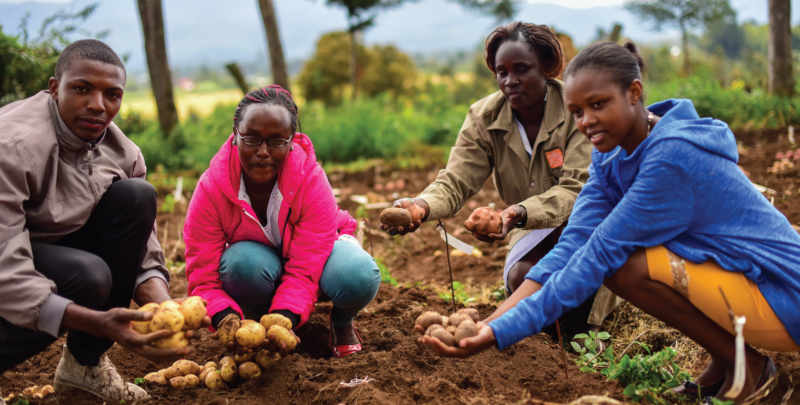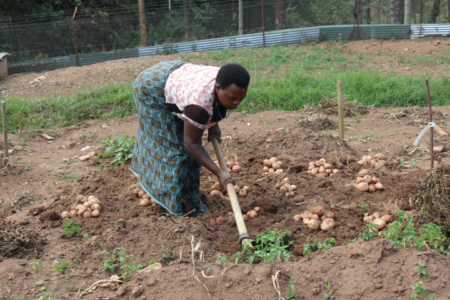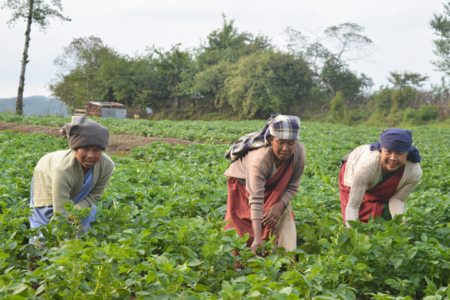
Creating an enabling environment for potato value chain development and opportunities.
This project improved the productivity and profitability of potato farming for inclusive, sustainable, agriculture-led economic growth and better nutrition of women farmers and children under age two in Kenya. This was accomplished through increased yields, improved market access, engagement in producer organizations and more structured market systems.
Background
Potato is the second most important staple crop in Kenya and has the potential to replace maize as the top food crop. Potato is a poverty buster and a key crop for food security from a household to national level. The high market demand and value in rural and urban areas, coupled with quick production cycles, continue to drive the expansion of the crop. However, despite its role as one of Kenya’s strategic food commodities, the potato industry has continued to face challenges along the value chain. Among these are limited access to quality seed and suboptimal agronomic practices, both of which result in low yield and low quality, high pest and disease prevalence, poor marketing and distribution infrastructure, limited adoption of high-yielding varieties, overreliance on rain-fed conditions, and climate variability due to climate change.
Through the Feed the Future Accelerated Institutional and Food System Development (AIFSD) program, CIP focused on supporting the establishment of potato seed systems at national and county levels, building capacity of extension services in good agricultural practices and basic agribusiness skills at the county level, supporting and building capacity of farmers’ organizations, establishing potato marketing systems, and supporting establishment of coordination bodies at the national level.
Objectives
Limited access to quality seed coupled with unstructured markets prevent farmers from equitably engaging in the value chain and thereby suppresses productivity and incomes, perpetuating poverty. The overall goal of AIFSD was to improve productivity and profitability of potato farming for inclusive and sustainable agriculture-led economic growth. The project had the following specific objectives:
- To increase the incomes of 10,600 farmers through higher productivity and improved market access.
- To boost productivity through greater use of certified seed of improved potato varietiess.
- To increase business performance of farmer producer organizations (FPOs) through structured potato market system.
- To improve the nutrition status of productive women and children under the age of two.
Approach
The program was premised on the theory of change that wide application of improved technologies, innovations, and the creation of expanded markets and market systems, using a value chain approach, can increase the farm productivity and incomes of participating potato farmers and other value chain actors. This contributed to improved food and nutrition security and reduced poverty and malnutrition in the two AIFSD project intervention counties of Bungoma and Taita Taveta. To enable farmers to farm as a business and participate equitably in a more developed value chain, the potato component of AIFSD worked with county governments and the private sector to focus on four key investment areas:
- Increase production of and access to certified seed of farmer and market demanded varieties through establishment of more diverse seed businesses
- Introduce production practices for commercially oriented potato farming
- Support FPOs to provide essential production and market services to members, linking push and pull sides of the market
- Create rural business and employment opportunities, in particular for women and youth, along the seed and ware potato production, marketing and processing value chains.
Outcomes
The project used technical backstopping to enable smallholder farmers to approach farming as a business through engagement in FPOs and better integration into the value chain and, especially, to promote women and youth engagement in FPOs and the value chain. AIFSD scaled up accomplishments of the prior USAID Accelerated Value Chain Development (AVCD) project with productivity-enhancing technologies, for better incomes. Adding depth to AVCD phase 2 interventions, AIFSD further developed the skills of 4,300 farmers in Bungoma and Taita Taveta counties with training from 2019 to 2021 to strengthen farming as a business through quality seed access, FPOs, and market system development. AIFSD further developed the capacity of institutions to foster an enabling and investment environment in the potato sector.
| Key targets | 2022 |
| Number of women and men participants | 10,349 |
| Annual potato sales value USD of program participants | 3,000,000 |
| Average potato yields of participants (tons/ha.) | 13 |
| Percentage of participants in nutrition-sensitive agriculture activities that were female | 60% |
| Percentage of participants in activities to increase access to productive economic resources that were female | 50% |
Contact
Dinah Borus
CIP Kenya
d.borus@cgiar.org
Thanks to our donors





